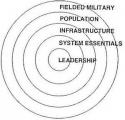
Originally Posted by
SteveMetz

Funny thing (well, not I mean funny like I'm a clown, not like I amuse you, I make you laugh) but I was just writing a section on that. I was arguing that President Bush seems inclined to a high risk/high potential payoff leadership style. In terms of the initial intervention in Iraq, he greatly overstated the certainty of his case. Since then, he has portrayed the only options in Iraq as "victory" or "cut and run."
But here's what I tried to suggest: our conundrum is that to get the public and Congress to support involvement in counterinsurgency in the first place, we have to overstate the threat and the extent of American interests. Americans don't want their sons and daughters dying for something that is peripheral. That then limits our strategic flexibility because it creates the impression that disengagement would be disastrous. It would be a defeat.
To me, that is just one more reason why the United States is ill equipped to undertake major counterinsurgency operations. My solution is that we no longer "do" counterinsurgency, but we do peace enforcement/stabilization. Two strategic and political advantages of that: it makes it easier to disengage when the costs exceed the expected benefits (while Clinton's withdrawal from Somalia and Reagan's withdrawal from Lebanon may, as commonly believed, give al Qaeda, Saddam Hussein and others the impression that the United States can be influenced by terrorism, they were probably the right moves). So long as we treat counterinsurgency as a variant of war, that means that one side (the side we support) is "right" and the other is "wrong." Americans don't like ties.
Second, casting the activity as peacekeeping/stabilization rather than counterinsurgency (with its Cold War overtones) will make it easier to attract multinational support.














Bookmarks